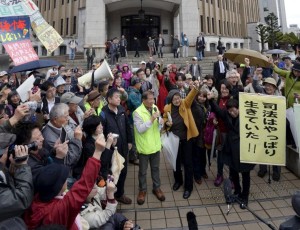Japan Court Halts Restart of Nuclear Reactors
On April 14th, a district court in Fukui, a city on the coast of the Sea of Japan, ordered an immediate halt in the revival of two reactors at the Takahama nuclear plant in a provisional injunction. The order, for now, prevents the Kansai Electric Power Company (KEPCO) from restarting operations at the plant, and is sure to deal a major blow to the company operations.

Although the government’s main nuclear agency, the Nuclear Regulation Authority (NRA), cleared the plants to be restarted in November 2014 and confirmed their safety, Fukui locals led the charge against restarting the reactors by collecting signatures on a petition and taking all necessary legal measures. This led to the District Court declaring that although the reactor might be safe in normal conditions, there was no guarantee that it would survive an earthquake and thus put all locals’ lives in danger.
Because of the nature of Japan’s territory as a small archipelago with few natural resources, nuclear power has been an efficient way for Japan to generate electricity. Japan launched its first nuclear reactors in the 1960’s, and because of a large emphasis on nuclear power development at the beginning of the 21st century, nuclear power reached its peak and was responsible for nearly one third of Japan’s total energy production in early 2011.
However, in March 2011, a magnitude 9.0 earthquake, the strongest ever to hit earthquake-prone Japan, changed the course of Japan’s nuclear industry in ways still visible today. The earthquake and subsequent tsunami led to the destruction of three of the six Fukushima I Nuclear Power Plant reactors, causing highly radioactive materials to leak out of the plant. This triggered the worst nuclear disaster since the Chernobyl power plant in present-day Ukraine exploded in 1986, and caused the Japanese government to close down nuclear power plants across the entire archipelago.
Following the earthquake and Fukushima disaster, public opinion on a national and local scale experienced a major shift. A majority of the population saw nuclear energy as a promising industry. However, that was before they learned, in the hardest way possible, of the dangerous consequences natural disasters could have on nuclear plants. When the Pew Research Center surveyed the Japanese population’s opinion on nuclear power in 2012, 70% of the poll respondents said Japan should reduce its dependency on nuclear energy.
A pro-nuclear lobby, however, does still exist, and it justifies its position citing environmental concerns. Indeed, Japan has been importing an increasing amount of fossil fuels like oil and coal to satisfy its energy needs in the wake of the post-Fukushima nuclear shutdown. Pro-nuclear lobbyists argue that a return to nuclear power would, barring any natural disaster, allow Japan to become more environmentally responsible and reduce its greenhouse gas emissions.
Although the government in power at the time of disaster soon pledged to completely phase out nuclear energy by 2040, current President Shinzo Abe, upon coming into power, revised Japan’s Basic Energy Plan to focus on resuming nuclear power plants. Even after the creation of the NRA and the development of stricter safety standards, this initiative still showed the government favoring nuclear businesses over the safety of locals.
Government emphasis on nuclear energy only served to widen the divide between the Japanese population, especially locals living near power plants, and Abe’s government as well as nuclear companies looking for profit, often at the expense of locals. Indeed, although evacuation plans had been put in place for people living within five kilometers of the Fukushima power plant in case of an incident, these plans disregard those situated beyond that radius.
Last week’s injunction shows the strength of the anti-nuclear movement in Japan today. The petition is not the first of its kind; in January, after the NRA approved the restart of the Sendai nuclear plant in Kagoshima, in southwestern Japan, locals took on similar legal actions. This petition garnered less support because Kyushu Electric Company, which runs the plant, threatened to sue locals to recover the income it would lose if the plant was not restarted. The court will deliver sentence on the restart later this month.
Locals in Fukui, however, refused to back down, and because of the nature of separation of power in Japan, the government can do nothing to intervene in KEPCO’s favor. The company does intend to fight the order, and officially appealed the injunction on April 18th. Ultimately, however, this legal battle only shows that unhappiness among the anti-nuclear movement in Japan is set to grow, and tensions in the relations between local communities living in the vicinity of nuclear power plants and the government will only continue to heighten.
